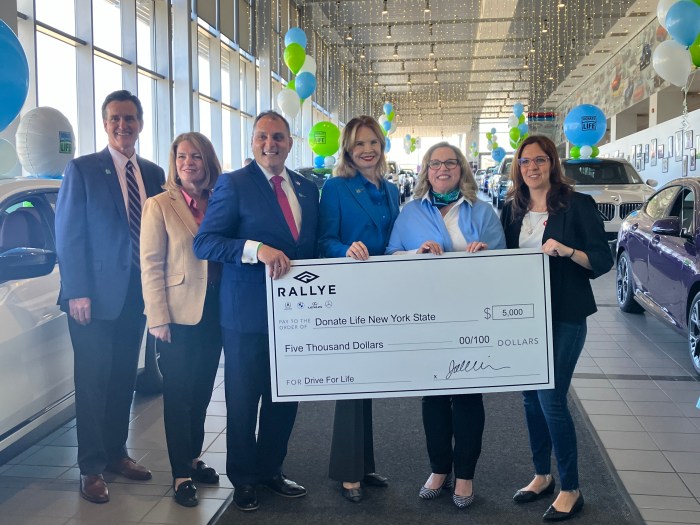Artificial intelligence may be the rage in the tech world these days, but Long Island business executives are not yet feeling the buzz and are not yet willing to invest their money in a world they don’t now understand, according to a recent survey.
Nearly seven in 10 of 118 CEOs who took the 2024 HIA Long Island Economic Survey said they will not be investing in AI, at least not this year. And 32% said they had no plans to invest in it in the near future — but they are curious about it.
The poll was conducted between Nov. 1, 2023 and Jan. 25, 2024 by Adelphi University and Citrin Cooperman, an accounting firm with offices in Melville.
The results come at a time when AI has taken hold of the public imagination with its often stunning ability to conduct conversations with users through Chatbox and other sites. At least six new books on AI were reviewed in a recent edition of The New York Times Book Review, with the reviewer warning that there is likely no going back from AI.
But so far, according to the Long Island poll, CEOs in this region remain reluctant.
“Artificial intelligence was not something that was being grasped on Long Island,” John Fitzgerald, a managing partner at Citrin, told an audience of about 250 people at a recent HIA breakfast. “It wasn’t thought of as being a mover or shaker going forward.”
Fitzgerald and others said, though, AI may yet have a future on Long Island, as companies are taking a wait-and-see approach to the technology, which often scares some unaccustomed to its capabilities. That is where fears of AI come in.
AI is capable of interpreting speech, playing games and identifying patterns. Eventually, computer scientists say, AI figures out how to win the games.
“We have to understand the capabilities of AI and put guardrails around it before we just dive in and do something irresponsible that changes our companies,” Fitzgerald said. “We have to walk before we run with AI.”
Peter Goldsmith, president of LISTnet, a business group in Plainview and a technology evangelist, agreed. But told the Press that ultimately, many companies, particularly larger ones, will have to make peace with AI.
“It’s just a matter of time” before they do, Goldsmith said. “It’s a must. It’s the same thing as when cell phones came along. Who doesn’t have a cell phone these days?”
If there is early hope for AI, it is with larger wholesale and distribution companies. In a poll separate from the HIA Long Island Economic Survey, PKF O’Connor Davies accountants and Siena College Research Institute found that two in 10 Long Island CEOs said they are using AI now and four in ten said they planned to going forward. The poll said that wholesale and distribution companies represented the largest number of early AI users. This survey was taken in late 2023 and polled 320 business leaders.
Rich Humann, CEO of H2M, an architectural and engineering firm in Melville, told the Press that the company has been using a form of AI for a decade, but called it computer-aided design.
“If you’re going to design a 10-story building, the CAD system will design it for you,” Humann said. “We just didn’t call it AI. But it’s a computer system.”
Humann said the company will likely rely on more advanced forms of AI in the future.
AI, Humann said, is likely to create more jobs going forward as it frees up employees to do more creative work.
Dr. Lawrence Eisenstein, chief public and community health officer for Catholic Health, told the HIA breakfast meeting attendees that AI has a genuine future in the healthcare industry in such areas as improving communications with patients and refilling prescriptions.
“AI is probably the single most important thing in the future of healthcare,” Eisenstein said. “If you don’t join in, you will be left behind.”
Dr. Martin Cantor, director of the Long Island Center for Socio-Economic Policy, who has followed the regional economy for decades, agreed that AI may well play a vital role in the future. But, he said, few companies are willing to be the first out the door.
“The bugs haven’t been flushed out yet,” Cantor told the Press. “Congress may weigh in on how the technology can be used.”
About 90 percent of the companies on Long Island are small businesses, Cantor said. So AI may never be a giant deal in the region. But it will be used.
Paule Pachter, CEO of Long Island Cares/The Harry Chapin Food Bank, said that the nonprofit is making use of AI now, through a system called Volunteer Matrix. Pachter said Long Island Cares uses the technology to track how many hours volunteers work, and what their preferences are.
“Volunteer Matrix gives us an accurate portrait” of volunteer services, Pachter said. “It is definitely AI. It’s here.”
“Will you and I be surprised one day to see a flying car on the Long Island Expressway?”, Pachter asked. “I don’t think so.”

































